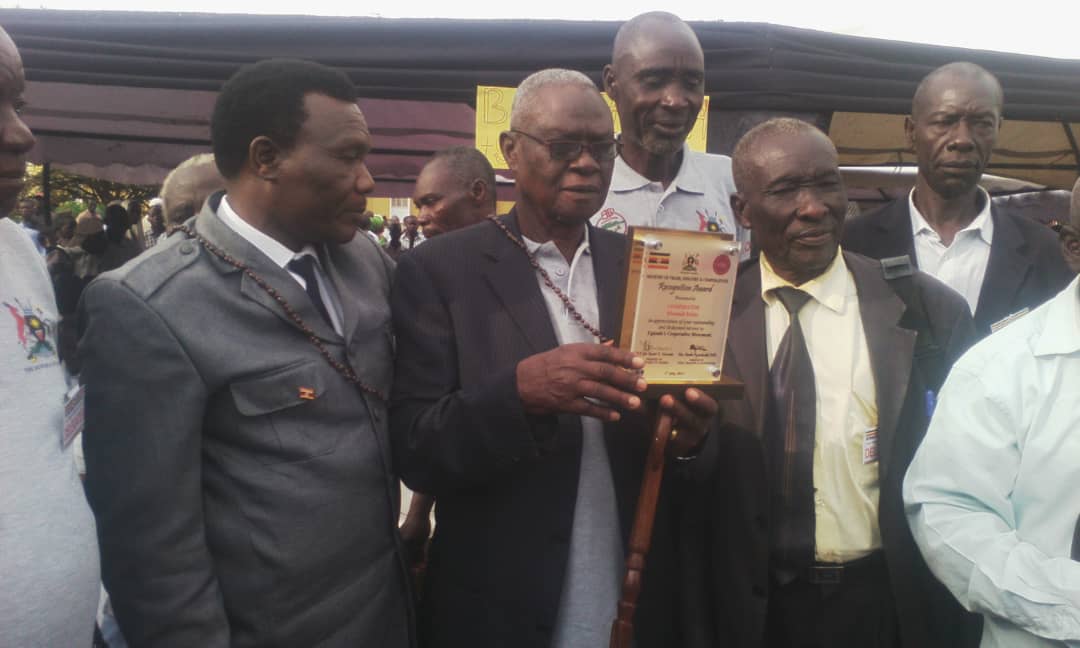Elders and opinion leaders of Bugisu sub-region have expressed fear over fresh conflicts and court cases that have marred Bugisu Cooperative Union (BCU), one of the few surviving unions in Uganda.
Mr. Enock Musundi, who led BCU for 18 years, between 1964 and 1982 expressed disappointment with delegates of nowadays who only focus on elections and allowances during the AGM. He urged the BCU members to use the internal structures, with the AGM being the supreme organ of the union, to settle grievances rather than rush to courts of law and the media.
He also advised coffee farmers to focus more on the business of the union by first demanding for audited books of accounts, the previous year’s work plan, the board performance on the resolutions of the previous AGM, coffee business, and the future plans.
Mr. Musundi, who acquired most of the assets urged Bagisu coffee farmers to focus on how they can fully revive their union in a liberal economy by embracing valve addition, for example, exporting processed and packed coffee.
The former BCU Chairman is a P.6 leaver but the most celebrated BCU Chairman. He urged leaders in the union to be honest, accountable and work for the farmers and not their personal interests.
Retired Rt. Reverend Samuel Wabulakha, the former Bishop of Mbale Anglican Diocese warned the Bagisu against divisions and politicising matters of BCU, bearing in mind that BCU is the major instrumental asset of the Bagisu (popularly referred to as the Bamasaaba) that greatly contributed to the development of Mbale town, as each street has a BCU building. He attributed the divisions in BCU to selfish interests that must be avoided.
Mr. Wamimbi Weasa, the first Umukuuka (King of the Bamasaaba) and Sir. Bob Mushikori the second Umukuuka of Inzu Ya Masaaba (the official cultural Institution of Bamasaaba/Bagisu) warned Bagisu against intrigue that will pull down BCU again. They further urged the aggrieved parties to use Inzu Ya Masaaba which is the neutral and unifying institution of Bagisu to resolve their differences such that BCU will continue carrying on business smoothly.
Mr. Julius Nakiyi, the lead petitioner from Budidi Growers Cooperative society, when contacted revealed that he is not fighting anyone and does not want to bring BCU down but he has noticed many loopholes in the management of BCU affairs under the leadership of Hon. Nathan Nandala Mafabi. He said these must be ironed out through a judicial review commission.
Nakiyi sighted some loopholes in the union like continuous registered loses and the creation of new rules during elections that are against the already set by-laws of BCU. For example, according to the new regulations, one requires a minimum of a Uganda Certificate of Education (UCE) in order to qualify to become a director and must be serving in his third term as a BCU delegate.
This provision is not in the by-laws. The By-laws state that any full member who is a delegate to the AGM from a primary society which patronises the Union, with a minimum of 2,500 Kgs of coffee, and with tested integrity and strong cooperative spirit, qualifies to be a Director.
On the other hand, Hon. Nathan Nandala Mafabi revealed that all union assets are in safe custody and they are now working on boosting business by buying coffee in cash, now at 6,000/= per kg, renovation of old buildings like Musundi house, opening of the 3300 acres of farmland in Bulambuli and a farmer’s radio station which is now on air.
He added that business is going on normally and they are hopeful that they are going to hold the AGM and elections after the 22nd November Court hearing by Justice Lydia Mugambe of the Civil Division High court Kampala. He finally urged those interested in participating in the union business and elections to follow the right the procedure because it is open to all qualified farmers as per the by-laws of their union.
It should be noted that in 2010 Nandala’s led board was thrown out until 2014 following a court order. However, within the four years of caretaker management set up by the government, BCU incurred several loses amounting to over 10 billion shillings.
END
